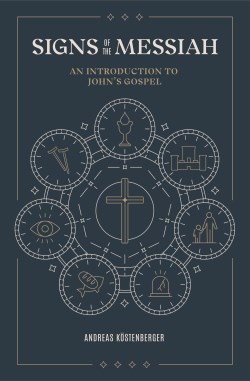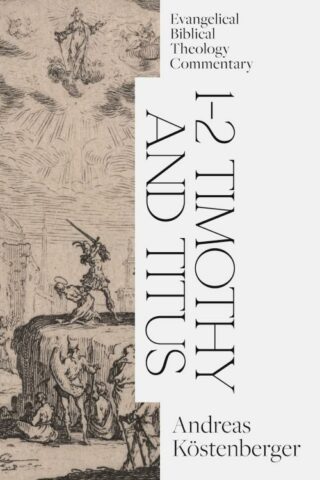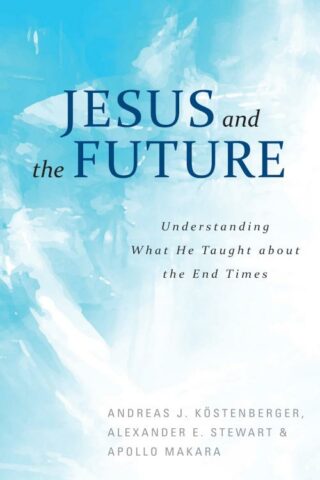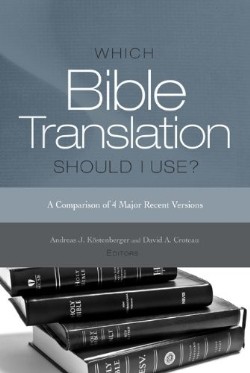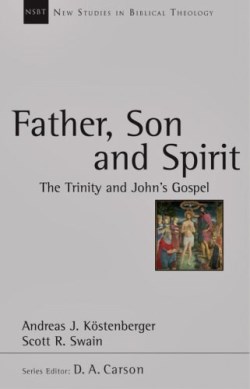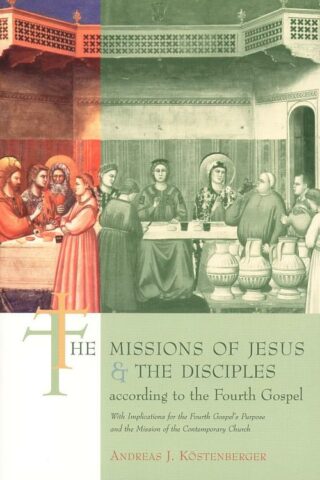Andreas Kostenberger
Showing all 6 resultsSorted by latest
-
Signs Of The Messiah
$27.99That you may believe
Have you ever asked God for a sign? Throughout Scripture, God gave signs to his people, whether mighty acts during the exodus or miracles through Elijah and Elisha. Jesus was also asked for a sign. Yet despite giving seven remarkable signs, his people refused to believe him.
In Signs of the Messiah, Andreas KAstenberger–veteran New Testament scholar and expert on the Gospel of John–guides readers through John and highlights its plot and message. John’s Gospel is written to inspire faith in Jesus. By keeping the Gospel’s big picture in view, readers will see Jesus’ mighty signs and be compelled to trust more fully in the Messiah.
Readers will have a deeper grasp of John’s message and intent through this short and accessible introduction.
Add to cartin stock within 3-5 days of online purchase
-
1-2 Timothy And Titus
$49.99Paul’s letters to Timothy and Titus provide all churches with much-needed direction.
In this EBTC volume, Andreas J. Kostenberger captures the rich theological contributions of Paul’s oft-overlooked letters to Timothy and Titus. Kostenberger highlights Paul’s mature reflections on doctrine, the church’s nature, mission, relationships, dynamics, and oversight, the Christian life, and the last days. Kostenberger analyzes these letters against the Old Testament and the rest of the New Testament, particularly Paul’s other letters and Acts.
The Evangelical Biblical Theology Commentary (EBTC) series locates each biblical book within redemptive history and illuminates its unique theological contributions. All EBTC volumes feature informed exegetical treatment of the biblical book and thorough discussion of its most important theological themes in relation to the canon–all in a style that is useful and accessible to students of Scripture.
Add to cartin stock within 3-5 days of online purchase
-
Jesus And The Future
$19.99Jesus was a prophet who often spoke about future events. Some readers apply all of Jesus’s teaching about the future to the distant future: his return, the future resurrection, and final judgment. Other readers contend that virtually everything Jesus taught about the future was fulfilled in the destruction of Jerusalem in AD 70. The authors conclude that the truth lies somewhere in the middle. As a prophet, Jesus spoke both about the near future events of AD 70 and the distant future events surrounding his second coming. The challenge lies in determining when he was speaking about near instead of distant future events.
In Jesus and the Future, the authors examine everything Jesus said about future events as recorded in the four canonical Gospels. This includes the famous Olivet Discourse along with many other parables and sayings. The authors situate Jesus’s teaching in its original literary and 1st century Jewish and Greco-Roman context.
Jesus and the Future is designed to discuss Jesus’ teaching about the end times in a way that is accessible, biblical-theological, exegetical, and devotional and spiritually-nurturing. Written with a scholar’s mind but a pastor’s heart, the book is geared to a popular audience interested in making sense of end-time phenomena and conflicting teachings on the end times.
Add to cartin stock within 3-5 days of online purchase
-
Which Bible Translation Should I Use
$14.99One of the most frequently asked questions related to the Bible is, “Which Bible translation should I use?” People often wonder what is the all-around best English Bible translation available. In this book, Douglas Moo, Wayne Grudem, Ray Clendenen, and Philip Comfort make a case for the Bible translation he represents: the NIV 2011 (New International Version), the ESV (English Standard Version), the HCSB (Holman Christian Standard Bible), and the NLT (New Living Translation) respectively.
In each case, the contributors explain the translation philosophy under- lying these major recent versions. They also compare and contrast how specific passages are translated in their version and other translations.
Which Bible Translation Should I Use? is ideal for anyone who is interested in the Bible and wants to know how the major recent English translations compare. After you’ve read this book, you will be able to answer the title question with confidence. You will also learn many other interesting details about specific passages in the Bible from these top experts.
Add to cartin stock within 3-5 days of online purchase
-
Father Son And Spirit
$29.99Series Preface
Authors’ Preface
AbbreviationsIntroduction: John’s Gospel And The Church’s Doctrine Of The Trinity
Part I: Historical Context
Part II: Biblical Foundations
Part III: Theological ReflectionsConclusion
Bibliography
Index Of Authors
Index Of Scripture References
Index Of Ancient SourcesAdditional Info
From the patristic period until today, John’s Gospel has served as a major source for the church’s knowledge, doctrine and worship of the triune God. Among all New Testament documents the Fourth Gospel provides not only the most raw material for the doctrine of the Trinity, but also the most highly developed patterns of reflection on this material-particularly patterns that seek to account in some way for the distinct personhood and divinity of Father, Son and Spirit without compromising the unity of God.While there have been recent, fine studies on aspects of John’s doctrine of God, it is surprising that none summarizes and synthasizes what John has to say about God as Father, Son, and Holy Spirit. In order to fill this gap, Kostenberger and Swain offer a fresh examination of John’s trinitarian vision in this New Studies in Biblical Theology volume.
Part One situates John’s trinitarian teaching within the context of Second Temple Jewish monotheism. Part Two examines the Gospel narrative in order to trace the characterization of God as Father, Son and Spirit, followed by a brief synthesis. Part Three deals more fully with major trinitarian themes in the Fourth Gospel, including its account of Jesus Christ, the Holy Spirit, and mission. A final chapter discusses the significance of John’s Gospel for the church’s doctrine of the Trinity, and a brief conclusion summarizes some practical implications.
Addressing key issues in biblical theology, the works comprising New Studies in Biblical Theology are creative attempts to help Christians better understand their Bibles. The NSBT series is edited by D. A. Carson, aiming to simultaneously instruct and to edify, to interact with current scholarship and to point the way ahead.
Add to cartin stock within 3-5 days of online purchase
-
Missions Of Jesus And The Disciples According To The Fourth Gospel A Print
$33.99This important work explores in depth the relationship between the mission of Jesus and of the disciples as presented in the Gospel of John, and explores the implications of these findings for the contemporary church. Based on a comprehensive semantic field of study that integrates biblical studies, theology, and missiology, this volume represents the first time such an approach has been used for the study of mission in John.
Andreas Kostenberger begins by surveying the state of research on mission in the Fourth Gospel, then covers foundational linguistic, definitional, and literary matters. The following two chapters contain the actual study of the missions of Jesus and the disciples. In discussing the disciples’ mission, special attention is given to the question of how later generations of disciples should be related to Jesus’ original followers.
The volume concludes with a chapter on the implications of Kostenberger’s findings for the Fourth Gospel’s purpose and for the mission of the contemporary church. Kostenberger engages missiological constructs based on the Fourth Gospel, including the so-called “incarnational model” of mission, and concludes that this model is seriously flawed and should be replaced by a “representational model” of mission that views Jesus’ followers as his representatives, who do not share in the theologically unique aspects of his incarnation.
Add to cartin stock within 3-5 days of online purchase






